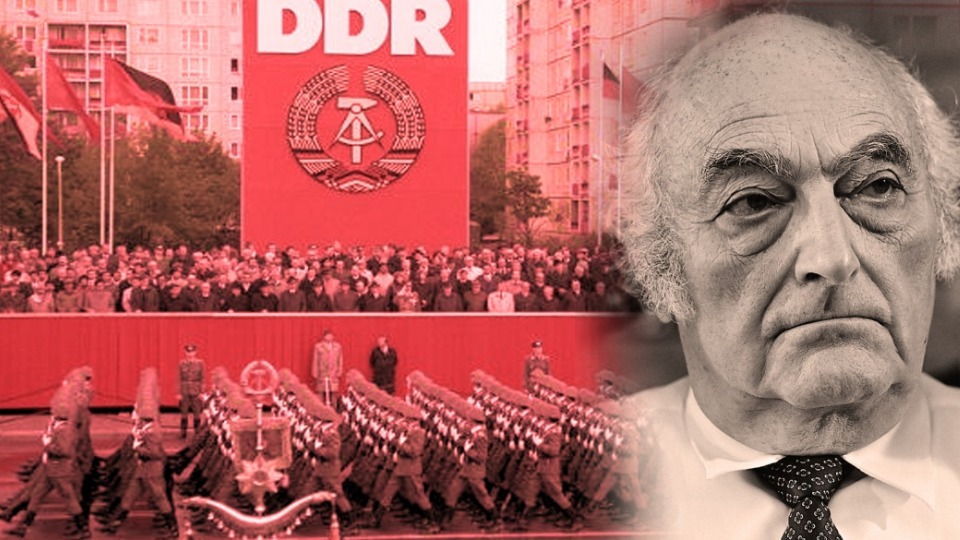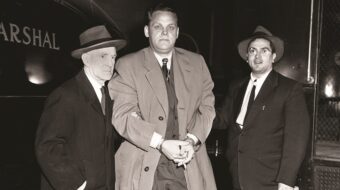
Stefan Heym—journalist, novelist, essayist—and a lifelong socialist, died 20 years ago, aged 88, on Dec. 16, 2001. His unfading commitment to humanity through his writing and actions must be remembered and celebrated.
Born in 1913 into a prosperous Jewish family in the industrial east German town of Chemnitz, he was Helmut Flieg until he changed his name after fleeing to Czechoslovakia in March 1933, the youngest literary escapee from the newly installed Nazi regime. More than one change of country lay ahead for him.
The Flieg family’s textile business had no attraction for the growing Helmut. In September 1931, already anti-militarist, he produced a poem prompted by a newspaper report of German military officers being sent to China as instructors.
He wrote: “We are exporting…Export in officers…Playing war is a healthy sport!” Later came: “One war they went and lost. But they’re still hungry to fight.…”
Printed in a local social democratic newspaper, this infuriated local Nazis, who had Helmut beaten up. Forced to leave his school, he continued his education in Berlin.
On Feb. 27 1933, he saw the Reichstag building go up in flames—Hitler’s excuse for suppressing all political opposition. Chemnitz Nazis, unable to arrest the son, took his father as a hostage.
A brother brought Helmut his mother’s plea—get out of Germany. He wasted no time. From Prague, he messaged her confirming his safe arrival, inventing the name of Stefan Heym to protect the family. Released from custody, his father later committed suicide.
In Prague, Heym scraped a living as a journalist. He became friends, among others, with John Heartfield, pioneer master of photomontage—artistry deployed dramatically against fascism.
In 1935, he took up an offer from a U.S. Jewish organization of a postgraduate scholarship in Chicago, repaying a loan for the cost of travel there with articles sent back to Czechoslovakia. His master’s thesis on radical 19th-century poet Heinrich Heine done, in New York he became editor of a new left-wing weekly paper for German readers, the Deutsches Volksecho.
Hostility to him sprang from a right-wing German social democrat figure, who gave Heym’s birth name away in another newspaper, if not quite accurately. By good fortune, as he learned much later, Nazi attempts to trace the connection between him and his obviously at-risk family failed.
After the Volksecho folded in 1939 for lack of funds, Heym found other work and began to write Hostages, with the harsh setting of Nazi-occupied Czechoslovakia.
Eventually he obtained U.S. visas first for his brother and then for his mother. Needing evidence he could support them, each time a wealthy man sympathetic to his request put a thousand dollars in his bank account—for three days—before Heym returned the sum. His mother was on the last boat to the U.S. containing Jewish German migrants before it entered the war.
He completed Hostages, which hit the U.S. bestseller list in 1942 and was quickly turned into a film. Keen to join the U.S. Army, Heym became a naturalized U.S. citizen and a sergeant in a Mobile Radio Broadcasting unit. He arrived in Normandy ten days after D-Day, following an idyllic pause in the Cotswold village of Wotton-Under-Edge.
In France, he played a key role in encouraging German soldiers to surrender, through leaflets, radio broadcasts, and news bulletins. As Allied forces advanced, however, it became evident that his adopted country’s leadership was ready to accept the continuance in positions of influence first of friends of Nazis in France and later of Nazis themselves in occupied Germany.
Heym’s socialist views about Germany’s future—and in relation to wartime ally the USSR—pleased his superiors less and less. He returned to the U.S. and was discharged from the army before 1945 ended.
The Crusaders was his next novel, based on his U.S. Army experience. When the book appeared, in February 1948, though its appeal was considerable, producing translation into more than 20 languages, its underlying political stance did not impress film sponsors.
A visit to Europe brought about a chance meeting with a cousin who had survived the war in Nazi-occupied Holland, hidden in the home of friends. Heym learned then of the concentration camp killings of two of his aunts.
In Czechoslovakia, he researched material for the Eyes of Reason, an ambitious, powerful novel which was given a post-war setting in that country. When this was published in 1951, many U.S. mainstream reviews were negative. One in particular targeted Heym as a traitor, against the background that the USSR had for years past been labelled in the West as an enemy. On the other hand, something about the book’s balanced political content inhibited its publication in communist-governed Czechoslovakia.
Meanwhile, Heym—and his wife and mentor Gertrude Gelbin (a member of the Communist Party USA)—were at risk, as were others, from the onslaught of the House Un-American Activities Committee. They exited to Europe and after a period of uncertainty were permitted to settle in Grunau, East Berlin—part of the newly formed German Democratic Republic (GDR).
Heym was to live there permanently. Gertrude, who was to be a publisher and editor of left-wing literature in English via Seven Seas Books, died in 1969. Heym’s next novel, Goldsborough, built around a miners’ strike in the U.S., and was published there in 1954.
In the GDR, Heym had quickly showed his journalistic independence of mind. He took a public stance against bureaucratic censorship. He was to produce two novels set in 19th-century Germany, The Lenz Papers and Lassalle, appearing in 1963 and 1974 respectively.
Publication in the GDR was, however, denied for his work Five Days in June, which centered on strikes and demonstrations in Berlin and their suppression in June 1953 with the help of Soviet tanks, and for another novel, Collin, though both were published in the West.
The King David Report, set in biblical times, but with modern resonance, was issued in the GDR by 1973, while The Architects was not published anywhere until after Heym’s death.
Heym’s novels had common features: vitality of characters and dialogue, uncapped imagination, flowing narrative, all underpinned by a conviction that people can change and that the conditions of human life can and should be better.
In the GDR, it should be said, former Nazis were kept out of public office, whereas in West Germany, judges during Nazi rule continued to be judges, and the intelligence service until the late 1960s was led by Hitler’s Eastern Front security chief, Reinhard Gehlen.
Though firmly supportive of socialism in the GDR, Heym continued to be openly critical of authoritarian aspects of its government, and in 1979 he was punished for this through a heavy fine.
He robustly resisted attempts to discredit him. The GDR’s security service, the Stasi, which focused, as post-GDR research revealed, on the roughly 2% of the population considered or suspected of being a security risk, took a close interest in him.
Stasi oversight of the Heym household over New Year 1978 led to sad farce. By his garden fence, he found a dropped Stasi notebook recording detailed secret observations from a nearby attic and more from another location.There was also open observation from a car parked outside, prompting Heym to bring over some complimentary coffee for the agents stationed there.
In 1988, his lengthy, vivid, and gripping memoir entitled Nachruf (Obituary) was published. But an obituary was more than a decade premature.
Having always avoided joining any political party, after the GDR merged with West Germany, he joined the Party of Democratic Socialism (PDS) and was elected to the Bundestag, the German Parliament. In November 1994, as the most senior elected member, he opened the legislative body’s proceedings.
He looked back at the country’s troubled parliamentary history, receiving a mixed response from fellow deputies. His speech included: “Please do not underrate a human existence in which, despite all limitations, money is not the all-decider, the workplace is a right of women equally with men, housing is affordable, and the most important part of the body is not the elbow.”
Heym’s work continues to have more than historical relevance and his memoir still cries out for an English translation.












Comments